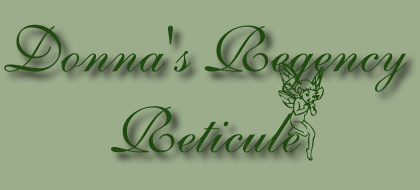


Hi all! What does the Reticule hold this month?
It is a 'mixed bag', so to speak, a little about life in the Regency era,
and a little about writing Regency romances.

Life In the Regency Era
Questions I Have Often Wondered About...
* More will be added from time to time.
Did they have bathrooms in their houses?
Yes And No. Flushable indoor toilets
were apparently invented in the 1770's. It was a heretical thing,
though, to have the toilet indoors - the lack of a ready way of disposing
of the noxious fumes likely accounts for the reluctance to have it nearby
- and most houses continued to have them outside, or located in an out-of-the-way
part of the house. In fiction, in describing a house, the author
usually used the phrase 'the usual offices' to descibe where the toilet
was situated.
What about premarital sex in Regency times?
I think some people have come to the
erroneous conclusion that the modern era is the first in which both sexes
have come to equally enjoy intercourse outside of the boundaries of marriage.
Nothing could be farther from the truth. Though the invention of
more reliable sources of birth control has allowed woman more freedom in
that way without fear of pregnancy, (some people would argue that) both
sexes always had their pre-marital and extra-marital flings. I read
somewhere recently (darned if I can remember where!) that in the early
1800's, an unusual survey indicated that a goodly portion of brides were
with child on the day of their wedding. You don't get that way without
some fooling around! Now, the Victorian era is a whole different
story!

Writing And Reading Regency
Romance Fiction
Q & A
Q - Are Regency Romances an accurate portrayal of how people lived then?
A - Probably not. Mine aren't, anyway.
Though I try to be accurate about many things - dates,
historical characters, inventions, word usage
- there are too many possibilities for error, and in a
lifetime of research I will never know everything.
Mistakes I have made? I caught a doozy in
my own work the other day, thankfully in the
copy edit, before it was due at the final copy stage.
I caught myself using the phrase 'mood swings'.
Hoo, boy! Is that 1990's or what? I humbly
begged them to take out the word 'swings'.
Hope they do it.
The bottom line is, I didn't
live then, and so everything, every character, every action, is
filtered through my millenium mind.
I can't help that, so I just strive for as much accuracy as
possible. And I try to avoid howlers
like the one above.
Q - Why the Regency era?
A - Why not?
No, seriously, the choice of what
era to write a historical romance about is controlled by
the era that appeals to you. I have
written a Victorian romance that, while pretty good
(I think, anyway) is an experience I have
no desire to repeat. I love the Regency era, the
sense of pending change, the jumbled politics,
the fine balance, like on the edge of a sword,
between Georgian sexual licentiousness and
Victorian repression. And I adore Jane Austen.
I suppose if I loved Charlotte and Anne Bronte
better, I would write about the Victorian era.

Donna's Regency Primer
Part One: A Word About Words

